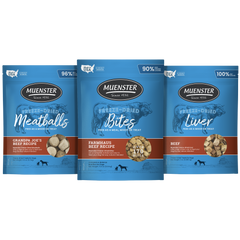Key Takeaways:
- Nutritional Powerhouse: Beef liver is rich in essential vitamins and minerals like vitamin A, B12, iron, and zinc that support overall dog health.
- Use with Care: While beneficial, liver must be fed in moderation to avoid issues like vitamin A toxicity, especially in puppies or small dogs.
- Smart Feeding Choices: Freeze-dried beef liver treats offer a clean, safe, and convenient way to introduce this superfood into your dog’s diet.
Beef liver. It’s the ingredient that gets tails wagging the moment the bag opens, and for good reason. It’s flavorful, packed with nutrients, and often hailed as a canine superfood. But like all good things, it comes with questions. Can dogs eat too much of it? Is it right for every pup? And how do you feed it without going overboard?
At Muenster, we’ve been crafting high-quality, science-backed dog food in Texas since 1932. We manufacture everything in-house, with no outsourcing and no cutting corners. That’s how we’ve earned the trust of generations of pet parents who care deeply about what goes into their dog’s bowl.
We believe in real ingredients, real results, and feeding dogs like the beloved family members they are. Let’s get into the pros and cons of giving beef liver to your dog.
Why Beef Liver Has Dog Parents Talking
If you’ve spent time scrolling through pet nutrition blogs or swapping stories with fellow dog parents, chances are beef liver has come up. This nutrient-rich organ meat is garnering considerable attention for its affordability, flavor, and nutritional value. And your dog isn’t the only one drooling over it.
At Muenster, we’re always tuned in to ingredients that truly make a difference in our dogs' health and happiness. Beef liver stands out as a whole food that offers real benefits. It’s rich in vitamins, easy on digestion, and dogs absolutely love the taste. It’s also one of the most effective ingredients to use when figuring out how to get picky dogs to eat; even the most stubborn eaters can't seem to resist it.
Beef liver is also a key player when it comes to freeze dried dog food—perfect for locking in flavor and nutrients without the mess or hassle of raw feeding. This makes it a smart addition for busy pet parents looking to upgrade their dog’s nutrition without a full diet overhaul. With all the buzz around it, it’s only natural to wonder if liver really lives up to the hype. Is beef liver actually good for dogs, or is there a limit to how much they should have?
Is Beef Liver Good For Dogs? Let’s Break It Down
Beef liver has earned its reputation as a canine superfood, but not just because dogs go wild for the flavor. It’s packed with powerful nutrients that support your pup’s health from nose to tail. Here’s what makes it such a standout addition to your dog’s diet:
It’s Loaded With Essential Vitamins
Beef liver is naturally rich in vitamins A, B2 (riboflavin), B3 (niacin), B5, B6, B12, and folate. These play a crucial role in everything from nerve health to energy production and cell function. Vitamin A in particular helps support vision, skin, and immune health, and it’s present in the liver in a form that’s easy for dogs to absorb.
A Natural Source Of Iron And Zinc
Iron is vital for transporting oxygen throughout your dog’s body, and zinc supports immune function, healing, and a healthy coat. Liver offers both forms that are more bioavailable than most plant-based or synthetic sources, making it a reliable addition to your dog’s bowl if you want to support energy levels and skin health naturally.
Copper And Other Trace Minerals Come Standard
Beef liver also provides important trace minerals, such as copper, which supports red blood cell production, along with selenium and phosphorus. These are critical for metabolic health and bone strength, and while they’re needed in smaller amounts, they’re just as important for long-term wellness.
High In Protein, Low In Fat
Organ meats, such as liver, are lean sources of high-quality protein. That means they help maintain muscle mass and overall body function without contributing excess fat to your dog’s diet. This makes beef liver a great option for dogs on calorie-conscious meal plans. Freeze drying helps retain nutrients while making it easy to store and serve.
The Nutritional Benefits Of Beef Liver For Dogs
We’ve touched on what makes beef liver a nutritional powerhouse, but let’s take a closer look at how those nutrients actually support your dog’s health. From shinier coats to sharper focus, the benefits of beef liver go beyond the basics. Here's how this organ meat works in your pup’s favor:
Supports Healthy Skin And A Shiny Coat
Beef liver is rich in vitamin A, zinc, and healthy protein, a trio that plays a key role in maintaining your dog’s skin barrier and promoting coat health. If your pup’s fur has been looking dull or their skin seems dry or flaky, the nutrients in beef liver may offer noticeable improvements over time.
Boosts Energy And Endurance
Because beef liver contains high levels of iron and B vitamins, it helps support the production of red blood cells and cellular energy. That means more oxygen gets delivered throughout the body, allowing your dog to stay active, alert, and ready for playtime. It's a smart addition to the diet of high-energy dogs or pups that need a little pick-me-up.
Enhances Immune Function
Liver is loaded with nutrients that help the immune system stay strong and responsive, including vitamin A, zinc, copper, and selenium. These work together to support your dog’s natural defenses, which is especially helpful during seasonal changes or times of stress.
Promotes Cognitive And Neurological Health
The B-vitamin complex in beef liver helps support brain function, mental clarity, and nerve health. This can be particularly beneficial for senior dogs or those that may require additional support as they age.
A Natural Way To Add Nutrients Without Fillers
One of the best things about beef liver is that it’s a real, whole food. You’re not relying on synthetic additives or mystery “flavor enhancers” to get the nutrition your dog needs. And when it's part of freeze dried dog food, you're getting that nutrition in a highly concentrated, shelf-stable form that fits into any mealtime routine.
Can Dogs Eat Too Much Liver?
Even with something as nutritious as beef liver, portion control still matters. While liver can be a great addition to your dog’s diet, feeding too much of it too often can lead to nutrient imbalances, especially when it comes to vitamin A.
Why Moderation Matters
Beef liver is high in preformed vitamin A (also known as retinol), which is essential for immune health, vision, and cell function. But unlike plant-based vitamin A sources, this form is absorbed more directly by the body. In excess, it can accumulate and potentially lead to a condition called hypervitaminosis A. Symptoms may include joint stiffness, digestive upset, or changes in bone development, particularly in growing puppies.
How Much Is Too Much?
A little goes a long way. As a general guideline, liver should make up no more than 5 to 10 percent of your dog’s total weekly food intake. If you're using beef liver as a treat or food topper, you're likely well within the safe zone—especially when you’re feeding freeze dried meals. For anyone wondering what is freeze dried dog food, it’s a lightweight, nutrient-rich option that allows for easy portioning and consistent nutrition.
Use Liver Strategically
Beef liver shines brightest when used as a high-value treat or a functional meal booster. It’s also one of our favorite tools when tackling how to get picky dogs to eat. A sprinkle of freeze dried liver over your pup’s meal can add flavor and aroma that encourages healthy eating without overloading on calories or nutrients.
How To Safely Feed Beef Liver To Your Dog
Adding beef liver to your dog’s diet doesn’t have to be complicated. With the right form and portion size, it can become a nutritious, crave-worthy addition to your dog’s routine. Here's how to serve it safely and confidently:
Start Small And Monitor
If your dog has never had beef liver before, begin with a small piece and observe how they respond. Every pup is different, and while most tolerate liver well, it’s always a good idea to introduce new proteins gradually. Start with a single treat or a sprinkle on their food, then slowly increase over a few days.
Choose Quality Over Quantity
Not all liver products are created equal. Sourcing matters, and so does how it’s prepared. We recommend choosing single-ingredient treats made from beef liver that’s gently processed will help to retain nutrients without additives or preservatives.
Use It As A Motivator
Because liver is naturally high in flavor, it’s perfect for training or encouraging picky eaters. If your pup turns their nose up at dinner, try using liver to coax them back to the bowl. It’s one of our top tricks for how to get picky dogs to eat, and it often works when nothing else does.
Final Thoughts
Beef liver isn’t just a tasty treat; it’s a powerful way to support your dog’s health with real, whole food nutrition. When used in moderation, it can enhance everything from coat condition to energy levels, while adding excitement to everyday meals.
At Muenster Pet, we’re proud to offer freeze dried beef liver treats that make it easy to give your dog something you can both feel good about. Whether you’re boosting mealtime, training with purpose, or just spoiling your fur baby a little, our liver treats are a small way to make a big difference.
If you’re curious about what is freeze dried dog food is or looking for new ideas on how to get picky dogs to eat, we’ve got plenty more insights to share. Because when your dog is healthy, happy, and well-fed, everybody wins.
Read Also:
- The Pet Perfect Holiday: A Guide To Celebrations With Furry Family Members
- Winter Fun With Your Dog Indoor Outdoor Adventures
- Mission K9 Rescue
Frequently Asked Questions About Beef Liver For Dogs
Can puppies eat beef liver safely?
Yes, but in very small amounts. Puppies are still developing, so their vitamin A needs are lower. A tiny piece once or twice a week is enough.
Does beef liver help with dog allergies?
Beef liver isn't a cure for allergies, but its zinc and vitamin A content can help strengthen skin and immune health, which may reduce the severity of allergic reactions.
Is beef liver suitable for dogs with kidney disease?
Dogs with kidney disease often need a low-protein diet. Since beef liver is high in protein and phosphorus, always check with your vet before feeding it.
How often should I feed my dog beef liver treats?
A few times a week is plenty. Overfeeding can lead to vitamin A toxicity. Treats should always complement a balanced diet, not replace it.
Can beef liver support my senior dog’s health?
Yes. Its B vitamins and iron can help boost energy and cognitive function in aging dogs, especially when included in moderation.
Do freeze dried liver treats lose nutrients during processing?
Not significantly. Freeze drying preserves most of the liver's nutritional value, making it a convenient and nutrient-rich treat option.
Is beef liver safe for dogs with sensitive stomachs?
Often yes, especially in small portions. Start slowly and monitor your dog’s digestion. If they show signs of discomfort, pause and consult your vet.
Sources:
- Morris, P. J., Salt, C., Raila, J., Brenten, T., Kohn, B., Schweigert, F. J., & Zentek, J. (2012). Safety evaluation of vitamin A in growing dogs. British Journal of Nutrition, 108(10), 1800‑1809. https://doi.org/10.1017/S0007114512000128
- Shastak, Y., & Pelletier, W. (2024). Pet wellness and vitamin A: A narrative overview. Animals, 14(7), 1000. https://doi.org/10.3390/ani14071000
- Frontiers in Veterinary Science. (2024). Stability of vitamin A at critical points in pet‑feed processing. Frontiers in Veterinary Science. https://doi.org/10.3389/fvets.2024.1309754






